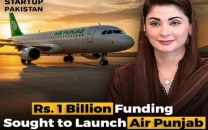‘Medical relief in flood-hit areas inadequate’
Red Crescent chief says they are providing relief to more than 55,000 people.

Pakistan Red Crescent Society Director General Major General (retd) Nawaz Khan said on Friday that medical assistance available in the flood-affected areas was inadequate and urged other organisations and individuals working in flood affected areas to expedite efforts for the purpose.
He was speaking to the media during a visit to PRCS’s tent villages for people displaced by floods in Dera Ghazi Khan. Khan said his organisation in collaboration with the International Federation of Red Cross was providing food, temporary shelter and medical aid to more than 55,000 flood affected people in the country.
PRCS Punjab Secretary Muhammad Salim told The Express Tribune that 1,200 families were given food parcels and other relief items in the province every day. He said these families were also availing medical facilities at the camps PRCS was operating in flood-affected areas.
Salim said the PRCS had so far donated relief goods provided by other donors to 6,500 people at their camps.
Khan said the PRCS had installed 10 water filtration plants at its camps in Dera Ghazi Khan, Rajanpur, Jacobabad, Qamber, Shadad Kot, Naseerabaad and Jaferabad to prevent outbreaks of water borne diseases among the residents. He said each filtration plant was supplying 3,200 litres of drinking water per hour. He said among other treated at the medical camps, most were suffering from diarrhoea and malaria.
Besides these camps, he said, three mobile health unit of the PRCS were operating in the Punjab, seven in Sindh and six in Balochistan. He said each mobile unit had a male doctor, a woman medical officer, a dispenser, a lady health visitor, two health promoters and an EPI technician.
Medicines worth Rs1 million had been provided to each MHU, he added.
Integrated Recovery Programme
Khan said the PRCS was undertaking an Integrated Recovery Programme (IRP) in areas exposed to floods in six districts of the Punjab, Khyber-Pakhtunkhwa and Sindh. He said the organisation was focusing on livelihood, shelter, water, sanitation and health sectors.
Published in The Express Tribune, September 29th, 2012.



















COMMENTS
Comments are moderated and generally will be posted if they are on-topic and not abusive.
For more information, please see our Comments FAQ